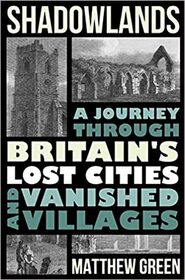Fascinating collection of (relatively) little know episodes in British history, telling the stories of places that, for different reasons, were abandoned and slipped from practical memory into a kind of "shadowland" of myth and legend.
I'll be honest and say that I enjoyed some chapters more than others -- by about three-quarters of the way through, I was bogged down a little, and found myself thinking uh-huh. uh-huh. Really? Again? That was cured, briskly and even movingly by a passionate, eye-opening final chapter about Capel Celyn, a Welsh village that was "drowned" in the 1960s when its valley was flooded to create a reservoir for drinking water for the City of Liverpool. Green really aces the account of the insensitivity of the Powers That Were to the feelings and desires of the people whose homes they destroyed --- shouldn't they be glad to lose the only homes they had ever known, and their community, as they were getting nice modern homes out of the deal? Why were they standing in the way of Progress? -- as he drags the stories of lost villages from the realm of quaint history to uncomfortably current.
A thoughtful coda really pulls it all together, suggesting that perhaps we should be paying attention to the fates of places like Skara Brae, in the Orkney Islands, and seaside towns like Winchelsea and Dunwich as climate change and the extremes of weather that it brings with it might also be bringing abandoned towns and villages to us, much too close for comfort, and sooner than we think.
What would have improved the book were some maps -- an overview of all the sites, and their relationship to each other would have been nice, and then, chapter by chapter, maps that showed the relationship of the lost to nearby towns and cities that survived, or grew up in their stead. And while I like the way that photographs were embedded in the text, instead of appearing out of context in a clump of random pictures, I would have liked proper captions, telling me exactly what I was seeing.
I'll be honest and say that I enjoyed some chapters more than others -- by about three-quarters of the way through, I was bogged down a little, and found myself thinking uh-huh. uh-huh. Really? Again? That was cured, briskly and even movingly by a passionate, eye-opening final chapter about Capel Celyn, a Welsh village that was "drowned" in the 1960s when its valley was flooded to create a reservoir for drinking water for the City of Liverpool. Green really aces the account of the insensitivity of the Powers That Were to the feelings and desires of the people whose homes they destroyed --- shouldn't they be glad to lose the only homes they had ever known, and their community, as they were getting nice modern homes out of the deal? Why were they standing in the way of Progress? -- as he drags the stories of lost villages from the realm of quaint history to uncomfortably current.
A thoughtful coda really pulls it all together, suggesting that perhaps we should be paying attention to the fates of places like Skara Brae, in the Orkney Islands, and seaside towns like Winchelsea and Dunwich as climate change and the extremes of weather that it brings with it might also be bringing abandoned towns and villages to us, much too close for comfort, and sooner than we think.
What would have improved the book were some maps -- an overview of all the sites, and their relationship to each other would have been nice, and then, chapter by chapter, maps that showed the relationship of the lost to nearby towns and cities that survived, or grew up in their stead. And while I like the way that photographs were embedded in the text, instead of appearing out of context in a clump of random pictures, I would have liked proper captions, telling me exactly what I was seeing.




